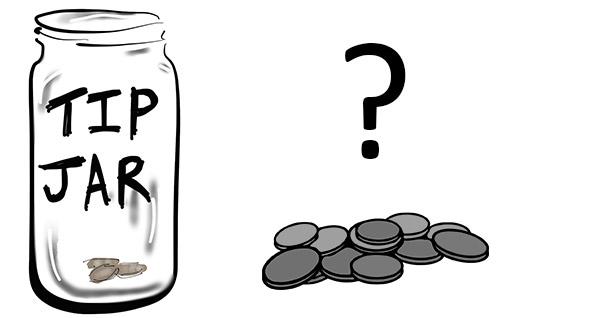 Whether or not to pay a tip and how much is a highly-debatable topic. Paying scuba diving liveaboard tips for staff & crew is quite common, but it should not be expected or asked for. It is quite a sensitive topic, because people from different countries, cultures, and walks of life will have their own opinion. Also, let’s not forget that if you ask someone who works as a Divemaster guide or Instructor, they are likely to give a more-inflated answer than a diving customer. Whether or not to pay a tip, and how much to pay involves so many variables, some of which we will try to list below.
Whether or not to pay a tip and how much is a highly-debatable topic. Paying scuba diving liveaboard tips for staff & crew is quite common, but it should not be expected or asked for. It is quite a sensitive topic, because people from different countries, cultures, and walks of life will have their own opinion. Also, let’s not forget that if you ask someone who works as a Divemaster guide or Instructor, they are likely to give a more-inflated answer than a diving customer. Whether or not to pay a tip, and how much to pay involves so many variables, some of which we will try to list below.
What is a tip (gratuity)?
- Possibly the most important thing to consider is that we are discussing ‘tips’ and not a service charge. You may go to a nice franchised restaurant that adds 10% to your bill as a service charge. They will state this at the bottom of the menu and it’s not possible to escape from paying it. ‘Tips’ (often called gratuities) are quite different. A tip comes from the customer’s heart as a reward or gift to the person who provided them with a service over and above what is expected. Restaurants and some bars are the most-common places where tips are paid, but there are many other times where employees provide a service that the customer or client is very satisfied with.
- In some cases, the staff’s salary package is dependent on tips, such as bar & restaurant staff in North America and car parking attendants. However, in scuba diving this is not the case. Divers may not earn much money, but they choose this lifestyle and career for their own reasons. This is quite different from taking whatever job is available in your home town just to survive financially.
- In our opinion, a tip should be earned, and it should come from the heart of the customer or guest. It should be 100% the customer’s own idea, and without others suggesting or pressuring them to pay it.
Different tipping cultures around the world
 It’s important to understand that around the world people come from thousands of different cultures, some of which have opposite views regarding paying tips and gratuities. For example, in North America it is common and expected. In some places a customer who doesn’t pay a tip may not be served again. The customers are conditioned to tip, and they expect to do so. However, on the other side of the world, it’s the opposite. For example, in Japan it’s almost seen as an insult. Have you ever seen Japanese people exchanging small coins on a restaurant table when paying the bill? This is not them being ‘stingy.’ It’s just their way of being fair and accurate regarding who pays for what. In between North America and the Far East there are hundreds of other cultures. Imagine divers from these very different cultures sitting on the same boat, listening to the tour leader discussing tips. One of them may be thinking ‘I know. I’m expecting to pay.’ And the other one may be thinking ‘Tip? What tip? I already paid for my diving service.’
It’s important to understand that around the world people come from thousands of different cultures, some of which have opposite views regarding paying tips and gratuities. For example, in North America it is common and expected. In some places a customer who doesn’t pay a tip may not be served again. The customers are conditioned to tip, and they expect to do so. However, on the other side of the world, it’s the opposite. For example, in Japan it’s almost seen as an insult. Have you ever seen Japanese people exchanging small coins on a restaurant table when paying the bill? This is not them being ‘stingy.’ It’s just their way of being fair and accurate regarding who pays for what. In between North America and the Far East there are hundreds of other cultures. Imagine divers from these very different cultures sitting on the same boat, listening to the tour leader discussing tips. One of them may be thinking ‘I know. I’m expecting to pay.’ And the other one may be thinking ‘Tip? What tip? I already paid for my diving service.’
Do the dive staff and crew expect or ask for tips?
- In most cases on the diving trips we sell paying a tip is ‘mentioned.’ At the end of the trip on the way back to the pier, the boat’s tour leader will say thank you to the guests and crew, and explain what guests need to do regarding equipment, transfers, where to find your shoes etc. This is when they will invite guests to think about a TripAdvisor review and they are likely to suggest that the staff & crew work hard all season and gave a good service. They will say that if you are happy with the service that there is a Tip Box or you can pay your Divemaster directly. Each dive centre, boat, and tour leader has their own way of mentioning tips. Some will suggest an amount, others will not. Some will talk about it at length, in an attempt to get as much as possible by trying to make guests pity the hard work and low income of the staff & crew. Others will mention it briefly and say no more.
- We can’t control or advise the staff on the boats but if we could, we would ask them to minimise all talk of paying tips. Guests who spend all day on a small boat or several days on a liveaboard will talk to other guests, and it’s likely to be discussed. Also, we believe that there should be a notice in a place that everyone will see it. That notice could be in several languages, because when the tour leader talks quickly (usually in English) not everyone will understand fully. Sadly, we have no influence on the staff of our boats with regards to ‘mentioning tips.’
What will happen if I pay very little or no tip?
- Nothing will happen. If you don’t want to tip, then don’t. It’s no problem. The tips are given at the end of the dive trips, so you won’t receive an inferior service for not tipping or for paying less than other people. It will already be too late for that. Also, the more-experienced dive staff will be aware that not everyone tips, and less-experienced dive staff are still learning. Maybe new dive staff don’t give such an outstanding service and they need to adapt to life as a dive guide.
- You have already paid a lot of money for a diving trip, which includes the service of the staff and crew. Maybe you’re from a culture or country where tipping is not normal, or maybe you have saved up a lot of your money for this trip and already gone over your planned budget. Let’s not forget that the diving trips we sell normally cost more than $150US per day.
How much is the normal tip for a liveaboard trip?
- There is no fixed amount. Some luxury liveaboards give suggestions on their own websites and booking terms, but in truth there is no fixed tip. In our opinion, 10% of the price of your trip (per person) is the maximum, especially for longer and more-luxurious liveaboard cruises. If we calculated the total tips, (including those who tip nothing, very little, an average amount, and a lot) it would probably be equal to 5-8% of the trip prices. This is just our estimate, but maybe a guide to go by. At the end of the day, you should not give a tip just because you feel pressured to do so. That way, it’s not a tip. It’s a fee.
- Dive staff and crew may be more enthusiastic at the start of the season than they are at the end. Also towards the end of the season they may have become accustomed to an average tip amount and they may come to expect it, at the same time becoming less enthusiastic after many months at sea. But that’s not your fault or problem, so do what you think is correct.
- We like to advise our guests to join a trip with a potential tip amount in mind, and then during the trip see if it’s warranted by better than average service.


